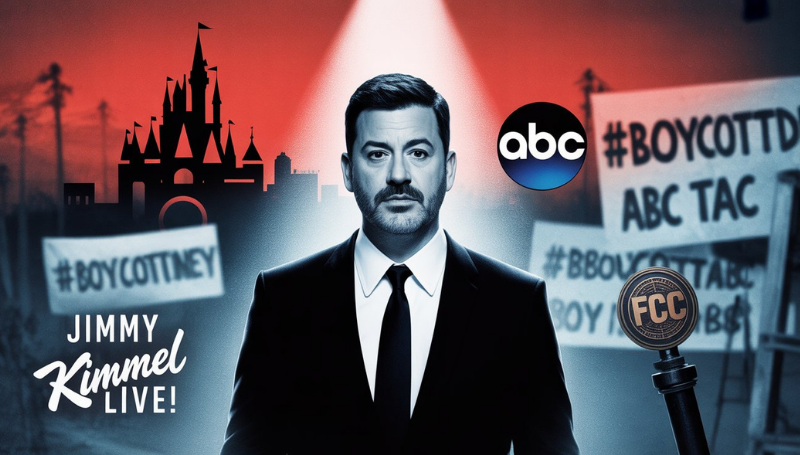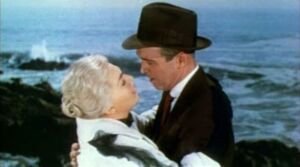
The Spark: Charlie Kirk’s Assassination and Kimmel’s Monologues
Timeline of Events Leading to Suspension
A Storm Gathers: FCC Threats and Affiliate Revolt
ABC’s Indefinite Preemption: A Corporate Calculation
The Divided Public: Reactions and Boycotts
Impact on Jimmy Kimmel’s Career and Late-Night TV
Broader Implications: Free Speech, Media Independence, and the Future
Financial and Commercial Ramifications
Conclusion: An Uncertain Future for Late-Night
FAQs on Jimmy Kimmel Suspension
Introduction
The phrase “Jimmy Kimmel Fired” has been trending across social media, sparking widespread debate and concern. However, reports confirm that Jimmy Kimmel was not officially fired or canceled; instead, his long-running late-night talk show, “Jimmy Kimmel Live!”, was preempted indefinitely by ABC on September 17, 2025. This unprecedented move represents a significant controversy in recent television history, highlighting the complex interplay between media corporations, political sensitivities, regulatory bodies, and fundamental issues of free speech.
The indefinite suspension followed inflammatory comments made by Kimmel concerning the shooting death of conservative activist Charlie Kirk, quickly escalating into a broader confrontation over media bias, government regulation, and corporate responsibility.
The Spark: Charlie Kirk’s Tragic Assassination and Kimmel’s Provocative Monologues
The controversy originated from the tragic shooting of Charlie Kirk, a prominent conservative activist and founder of Turning Point USA, who was fatally shot on September 10, 2025, at Utah Valley University during a speaking engagement. Kirk had been a close ally of President Donald Trump and was recognized for his “Change My Mind” debates and MAGA perspective. Twenty-two-year-old Tyler Robinson was arrested and charged with aggravated murder, with prosecutors indicating they would seek the death penalty. The incident immediately became politically charged, with various factions attempting to characterize the shooter’s motivations and political affiliations. Reports on the accused killer noted he was registered as an unaffiliated voter in Utah, though some officials, including Utah Governor Spencer Cox, suggested he held a “leftist ideology”.
On Monday, September 15, 2025, during his opening monologue on “Jimmy Kimmel Live!,” Kimmel addressed the Kirk shooting and the political reactions surrounding it. His comments proved to be career-defining in their consequences: Kimmel stated, “We hit some new lows over the weekend with the MAGA gang desperately trying to characterize this kid who murdered Charlie Kirk as anything other than one of them and doing everything they can to score political points from it”. This was interpreted by critics as implying the shooter was MAGA-aligned, though Kimmel framed it as satire on hypocrisy.
Kimmel’s monologue extended beyond the basic characterization of the shooter’s political affiliations. He criticized the flying of flags at half-staff in Kirk’s honor and ridiculed President Trump’s response to the tragedy, stating: “This is not how an adult mourns the murder of someone he refers to as a friend; it resembles how a toddler grieves for a goldfish”. The host also challenged Vice President JD Vance’s comments blaming the left for the murder, reminding viewers of Department of Justice data showing far-right groups as leading sources of extremist violence in the United States.
A subsequent monologue on Tuesday, September 16, included similar sentiments, with Kimmel stating that “many in Maga-land are working very hard to capitalize on the murder of Charlie Kirk”.
Critics swiftly interpreted Kimmel’s remarks as insensitive, politically biased, and an unsubstantiated claim. Supporters, however, argued it was satirical commentary on political hypocrisy and an exercise of free speech.
Timeline of Events Leading to Suspension
The events unfolded rapidly over a week in September 2025:
- September 10-11, 2025: Charlie Kirk is fatally shot at Utah Valley University. Tyler Robinson is arrested and charged with aggravated murder.
- September 12-14, 2025: Conservative figures mourn Kirk and accuse left-wing rhetoric of inciting violence. Social media circulates claims about the shooter being a leftist, though investigations are ongoing and the accused is registered as an unaffiliated voter. Kimmel addresses Kirk’s death earlier in the week, calling for unity against gun violence without controversy.
- September 15, 2025 (Monday): Jimmy Kimmel delivers his controversial monologue on “Jimmy Kimmel Live!”, criticizing the “MAGA gang” for exploiting the tragedy and mocking President Trump’s response. The episode airs, drawing immediate online backlash.
- September 16, 2025 (Tuesday): FCC Chairman Brendan Carr threatens ABC with “remedies” for “news distortion” and urges affiliates to preempt the show. Kimmel delivers a second monologue with similar sentiments.
- September 17, 2025 (Wednesday): Carr appears on Benny Johnson’s YouTube program, criticizing Kimmel’s statements as “the sickest conduct possible” and suggesting the FCC might revoke ABC affiliate licenses. Nexstar Media Group, operating 32 ABC affiliates, announces it will cease airing “Jimmy Kimmel Live!” for the “foreseeable future”. Sinclair Broadcast Group also preempts the show, stating it would not return the program until “appropriate steps have been taken” and even calling on Kimmel to apologize and make a donation to the Kirk family and Turning Point USA. Tegna also joins the pull. Later on Wednesday evening, ABC announced its decision to suspend “Jimmy Kimmel Live!” indefinitely. An ABC spokesperson confirms the show would be “pre-empted indefinitely“.
- President Trump celebrates on Truth Social, calling it “Great News for America”.
- September 18, 2025 (Ongoing): Hollywood reacts with support for Kimmel; reports indicate staff shock and potential legal challenges from groups like the ACLU. Boycotts trend, with liberals calling for #BoycottDisney.
A Storm Gathers: FCC Threats and Affiliate Revolt
The reaction to Kimmel’s comments was swift and severe. Federal Communications Commission (FCC) Chairman Brendan Carr, aligned with the Trump administration, played a pivotal role, issuing public warnings about potential regulatory action against ABC and its affiliates. Carr’s intervention marked an unprecedented escalation in regulatory pressure on broadcast networks.
- Public Warnings and Criticism: During his September 17 appearance on Benny Johnson’s YouTube program, Carr condemned Kimmel’s remarks as “the sickest conduct possible” and suggested they did not operate “in the public interest”. He characterized Kimmel’s comments as an “intentional effort to mislead the American people about a very core fundamental fact”.
- Threats of License Revocation: Carr explicitly warned of potential regulatory action against ABC and its affiliates, including the possibility that the FCC might revoke the licenses of ABC affiliates. He urged affiliates to “push back” against ABC, citing a potential “pattern of news distortion” as grounds for license revocation.
- “Easy Way or the Hard Way” Ultimatum: Carr’s statements included a direct ultimatum, indicating the FCC’s intent to compel action. He stated, “We can do this the easy way or the hard way. These companies can find ways to change conduct and take action, frankly, on Kimmel or, you know, there’s going to be additional work for the FCC ahead”. This language clearly suggested coordinated regulatory pressure designed to influence corporate decision-making.
- Praise for Affiliates’ Actions: After Nexstar Media Group and Sinclair Broadcast Group preempted Kimmel’s show, Carr publicly praised their decisions, signaling approval for their “doing the right thing”.
- Informal Censorship: Critics, including the American Civil Liberties Union (ACLU) and the Writers Guild of America (WGA), viewed Carr’s actions as a form of “informal censorship”. They argued that government officials were using the threat of regulatory power to pressure private companies into silencing political criticism, thereby evading constitutional constraints on formal government censorship. This sets a dangerous precedent, transforming a regulatory body into a tool for political retribution and chilling free speech.
Following Carr’s public statements, major affiliate station groups took immediate action. Nexstar Media Group, one of the largest owners of local television stations in the United States, operating 32 ABC affiliates, announced on Wednesday, September 17, it would cease airing “Jimmy Kimmel Live!” across its ABC-affiliated markets for the “foreseeable future”. Andrew Alford, President of Nexstar’s broadcasting division, stated that Kimmel’s remarks were “offensive and insensitive at a critical time in our national political discourse” and did not reflect the “values of the local communities in which we are located”.
Nexstar’s decision was strategic, as the company was in the midst of a critical $6.2 billion acquisition of broadcast rival Tegna, a deal requiring the Trump-led FCC’s approval. Nexstar’s preemptive move, praised by Chairman Carr, served as a calculated signal to the FCC aimed at smoothing the path for its merger approval.
Sinclair Broadcast Group also preempted the show, stating it would not return the program until “appropriate steps have been taken” and even called on Kimmel to apologize and make a donation to the Kirk family and Turning Point USA. Sinclair even replaced some episodes with Charlie Kirk tributes. Other station groups reportedly contacted ABC, indicating a broader affiliate backlash that influenced the network’s ultimate decision.
ABC’s Indefinite Preemption: A Corporate Calculation
Later on Wednesday evening, facing significant pressure from its affiliates and the explicit threats from the FCC Chairman, ABC announced its decision to suspend “Jimmy Kimmel Live!” indefinitely. An ABC spokesperson confirmed the show would be “pre-empted indefinitely,” using television industry terminology for when programming is replaced or removed from schedules. This decision effectively removed one of America’s most popular and influential late-night programs from broadcast television. While the show had not been officially canceled, there was no timeline established for its potential return.
The Walt Disney Company, as ABC’s parent corporation, faced complex considerations. Disney’s decision-making was influenced by regulatory pressure from the FCC, affiliate station concerns, and broader corporate strategic interests. The company’s extensive business interests, including theme parks, streaming services, and media properties, made it vulnerable to political pressure and regulatory action. A critical factor was Disney’s ongoing negotiations and regulatory approvals, notably ESPN’s acquisition of the NFL Network, which required FCC regulatory approval and placed Disney in a vulnerable position given the Trump administration’s history of targeting media companies. The suspension of Kimmel’s show can be seen as a strategic measure to avoid attracting further ire and to demonstrate compliance in the hope of securing merger approval. The timing of ABC’s announcement suggests coordinated pressure from multiple stakeholders influenced the network’s decision-making process.
The Divided Public: Reactions and Boycotts
The controversy ignited a furious debate that quickly divided along political lines.
- Presidential and Administrative Reactions: President Donald Trump’s response to Kimmel’s suspension was celebratory and expansive, reflecting his long-standing criticism of the late-night host. Trump posted on Truth Social: “Great News for America: The ratings-challenged Jimmy Kimmel Show is CANCELLED. Kudos to ABC for finally having the guts to do what needed to be done”. His statement characterized the suspension as a cancellation, though ABC had described it as an indefinite suspension. Trump’s reaction extended to criticisms of other late-night hosts, calling Jimmy Fallon and Seth Meyers “two total losers” on “Fake News NBC” and advocating for similar action against their programs. The official White House social media account also celebrated, calling Kimmel a “sick freak”.
- Conservative Movement Response: The conservative movement’s reaction to Kimmel’s suspension was overwhelmingly positive, viewing it as vindication of long-standing complaints about media bias. Conservative commentators and activists celebrated the decision as evidence that corporate accountability was possible when sustained pressure was applied. This success was viewed as a template for future efforts targeting media personalities and programming. Bill O’Reilly, while expressing sadness over the suspension, opposed “cancel culture”.
- Liberal and Industry Response: The entertainment industry responded with shock and concern about precedent-setting implications. Multiple sources described industry professionals as “shell-shocked” by the decision, expressing disbelief at the suspension’s rapidity and scope. These reactions reflected broader concerns about the implications for creative freedom and political commentary in entertainment programming. Audience members who had traveled to attend Kimmel’s show expressed frustration with ABC’s decision, with one asking: “What about freedom of speech?“. Civil liberties advocates, media figures, and Democratic politicians widely condemned the suspension as an attack on free speech. The ACLU framed the event as the latest example of the Trump administration’s “unconstitutional plan to silence its critics” and noted that ABC and its affiliates were “cowering to threats” from the government. The Writers Guild of America (WGA) argued, “If free speech applied only to ideas we like, we needn’t have bothered to write it into the Constitution”. Democratic Senate Minority Leader Chuck Schumer called the move “censorship in action” and urged people “across the political spectrum” to speak out.
- Boycotts: The hashtags #BoycottABC and #BoycottDisney trended. These boycotts were initiated by conservatives before the suspension to pressure the network, and after the suspension by liberals and civil liberties advocates to protest Disney’s perceived capitulation to censorship, with some choosing to cancel subscriptions in response.
Impact on Jimmy Kimmel’s Career and Late-Night TV
The immediate impact on Jimmy Kimmel’s career is profound uncertainty.
- Professional and Personal Consequences: Kimmel’s reaction to the suspension was reportedly one of intense anger and frustration, described as “absolutely furious” and “f–king livid“. The comedian was characterized as being in discussions with the network while maintaining that the suspension represented “government overreach“. His professional standing, built over more than two decades, faced unprecedented challenges. His wife, Molly McNearney, serves as head writer and executive producer of “Jimmy Kimmel Live!”, complicating the personal and professional dimensions of the controversy. Kimmel’s contract was set to expire in May 2026, and he had previously contemplated ending his late-night show in 2022, adding uncertainty to his future television career. As of this report, Kimmel has made no public statement on the matter since the suspension.
- Ratings and Commercial Implications: President Trump characterized Kimmel as “ratings-challenged”. Data from September 2025 showed Kimmel’s show had fallen 11% to 1.104 million viewers. While averaging 1.57 million viewers per episode (slightly less than Stephen Colbert’s 1.9 million), the suspension cannot be explained purely by ratings concerns, but by the complex interplay of politics, affiliate pressure, and corporate risk aversion. Late-night television, in general, faces broader challenges from streaming, changing viewing habits, and political polarization. The suspension meant significant financial implications for ABC, Disney, and affiliated stakeholders, eliminating a reliable advertising revenue stream.
- Comparisons with Other Late-Night Hosts: The Kimmel controversy occurred against the backdrop of other high-profile situations in late-night TV.
- Stephen Colbert: CBS announced the cancellation of “The Late Show with Stephen Colbert,” effective May 2026. While CBS attributed the decision to financial considerations (an estimated $40 million in annual losses and a $100 million annual budget), it coincided with Paramount (CBS’s parent company) seeking FCC approval for a major merger with Skydance Media. This followed Colbert’s on-air criticism of Paramount for settling a defamation lawsuit with Donald Trump. These parallels suggest a new form of “coordinated pressure” or “informal censorship” against politically outspoken hosts during politically sensitive periods involving corporate mergers.
- Bill O’Reilly: In contrast, Bill O’Reilly was dismissed from Fox News in 2017 due to sexual harassment allegations, not because of the political content of his commentary. This distinction highlights the unique, politically-driven nature of the Kimmel and Colbert situations.
- Jimmy Fallon and Seth Meyers: Though President Trump also criticized Jimmy Fallon and Seth Meyers, their programs did not face similar suspensions, making Kimmel’s case unique due to the direct affiliate and FCC pressure.
Broader Implications: Free Speech, Media Independence, and the Future
The Kimmel suspension has far-reaching implications for late-night television and democratic discourse.
- First Amendment and Regulatory Concerns: FCC Chairman Carr’s direct involvement in content disputes and explicit threats regarding license revocations raised significant questions about free speech protections and the unprecedented expansion of government influence over media content. Critics argued that such regulatory pressure, while legally permissible under broadcast licensing authority, represented an indirect form of government influence that effectively limits speech without direct censorship. This is considered a form of “informal censorship,” where government officials leverage their authority over corporate interests (like multi-billion-dollar business deals requiring regulatory approval) to influence and ultimately silence critical voices. The ACLU noted that this sets a dangerous precedent, transforming a regulatory body into a tool for political retribution and chilling free speech.
- Corporate Responsibility and Public Interest: The controversy highlighted tensions between corporate interests and public service obligations in broadcast media. Networks’ dependence on affiliate stations and regulatory approval created vulnerabilities to political pressure that could compromise editorial independence. Nexstar’s emphasis on “community values” and local sensitivities reflected broader questions about the appropriate level of local control over national media content. The regulatory framework governing broadcast media created inherent tensions between commercial interests and public service obligations, which were exploited for political purposes.
- Industry-Wide Impact: The successful application of regulatory and affiliate pressure to influence content decisions demonstrated new vulnerabilities in the traditional network-affiliate relationship. Future hosts and networks will likely face increased scrutiny regarding political content, calculating risks associated with controversial commentary. This represents a significant shift in industry risk assessment and the growing influence of local station groups in content decisions. The incident could lead to a “chilling effect” on political satire and criticism in the late-night genre, as media companies may engage in greater self-censorship to avoid similar consequences.
Financial and Commercial Ramifications
The suspension of “Jimmy Kimmel Live!” represented significant financial implications for ABC, Disney, and affiliated stakeholders. Late-night programming generates substantial advertising revenue, and the indefinite suspension eliminated a reliable income stream during a period of industry-wide financial pressures. The decision to prioritize regulatory relationships and affiliate satisfaction over immediate revenue considerations reflected corporate strategic calculations extending beyond short-term financial interests.
Disney’s broader business portfolio made the company sensitive to regulatory pressure across multiple segments. Affiliate revenue-sharing arrangements meant that Nexstar and other station groups also faced financial implications from the suspension, though their willingness to forego Kimmel-related revenue demonstrated the priority placed on political positioning over immediate commercial interests. The Kimmel suspension contributed to broader uncertainty in late-night television advertising markets, as sponsors and advertisers faced increased risks associated with politically controversial content, potentially affecting advertising rates and program valuations across the industry.
Kimmel’s estimated net worth is $50 million in 2025, with an annual salary reported to be $15 million, with potential bonuses bringing total earnings from the show to as much as $24 million per year. While financially secure, the suspension halts these earnings temporarily and raises questions about his long-term career outlook. He also earns significant income from hosting high-profile events like the Academy Awards, production work, and endorsement deals.
Conclusion: An Uncertain Future for Late-Night
The indefinite suspension of “Jimmy Kimmel Live!” is a pivotal moment in American media history, demonstrating the complex interplay between political pressure, regulatory authority, corporate decision-making, and the boundaries of free speech. The rapid succession of events—from Kimmel’s Monday monologue to ABC’s Wednesday suspension—illustrated how quickly political controversies can escalate into career-defining crises in contemporary media, with multiple pressure points available for influencing media content.
The precedent established by this suspension has far-reaching implications for the future of late-night television and political commentary in broadcast media. It suggests that established, profitable programming can be vulnerable to coordinated political pressure when regulatory, affiliate, and corporate interests align. Whether Jimmy Kimmel returns to late-night television will likely depend on the resolution of the underlying political tensions that precipitated the controversy. The incident highlights fundamental questions about media independence, government influence, and the role of corporate media in democratic discourse, and will likely reshape the landscape of American late-night television for years to come.
FAQs on Jimmy Kimmel Suspension
1. Was Jimmy Kimmel fired, suspended, or canceled?
Not fired or canceled outright; his show “Jimmy Kimmel Live!” was preempted indefinitely by ABC, meaning it was suspended without a set return date.
2. What exactly did Jimmy Kimmel say about Charlie Kirk, and in what context?
In his September 15 monologue, Kimmel accused the “MAGA gang” of trying to “score political points” by mischaracterizing the shooter of Charlie Kirk as “anything other than one of them.” He also mocked President Trump’s reaction to the killing, likening it to how a “four-year-old mourns a goldfish”.
3. What remarks led to backlash?
The backlash was a direct result of his Monday, September 15 monologue, and a similar one on Tuesday, September 16, implying ties between the shooter and MAGA supporters and criticizing Trump’s response.
4. Why did Kimmel face calls for cancellation/suspension?
His remarks were seen by critics as insensitive and politically biased amid national grief. FCC threats and affiliate pressure amplified these calls, critically leading to the suspension.
5. Was the show canceled or pulled?
It was “pulled indefinitely” by ABC after affiliates refused to air it, effectively a suspension.
6. What role did ABC/Disney play?
ABC, owned by Disney, yielded to pressure from affiliates and FCC threats to avoid further conflict and protect its other business interests, such as ESPN’s acquisition of the NFL Network, which required FCC approval.
7. What was the FCC/Brendan Carr’s stance?
FCC Chairman Brendan Carr, a Trump appointee, publicly threatened ABC/Disney with regulatory action, including fines or license revocation, for “news distortion” and called Kimmel’s comments “the sickest conduct possible.” He praised affiliates for pulling the show.
8. Were Sinclair Broadcast Group, Nexstar, Tegna involved?
Yes. Nexstar (the largest U.S. station owner) led the charge, refusing to air the show across its 32 ABC affiliates. Sinclair also preempted episodes, replacing some with Kirk tributes, and demanded an apology/donation. Tegna joined in refusing to air, citing community standards. Nexstar’s decision was influenced by its pending $6.2 billion acquisition of Tegna, which required FCC approval.
9. What has Kimmel officially stated in defense?
As of this report, Kimmel has made no official public statement on the matter since the suspension.
10. How have ratings, boycotts, and public trust been affected?
Pre-controversy, Kimmel’s show was “ratings challenged” (averaging 1.57 million viewers, lower than Colbert). Dual boycotts (#BoycottABC, #BoycottDisney) are trending from both conservatives and liberals for opposing reasons. Public trust in media has been further eroded.
11. How does this compare to controversies involving Stephen Colbert, Jimmy Fallon, Bill O’Reilly, and other late-night hosts?
Kimmel’s case is most similar to Stephen Colbert’s show cancellation, which also occurred amid corporate mergers requiring Trump administration approval and following criticism of Trump. Bill O’Reilly’s dismissal was due to sexual harassment allegations, not political content. Jimmy Fallon and Seth Meyers faced criticism but no suspension.
12. What are the larger implications for late-night TV and free speech?
The incident highlights a new form of “informal censorship” and sets a dangerous precedent, potentially leading to a “chilling effect” on political satire and criticism, eroding media independence, and amplifying corporate/political influence over content.
13. What is Kimmel’s net worth, salary, and career outlook after this incident?
Kimmel’s estimated net worth is $50 million in 2025, with an annual salary from the show ranging from $15-24 million. His career outlook is uncertain, as his contract expires in May 2026, and the indefinite suspension leaves his professional future with ABC in question.



